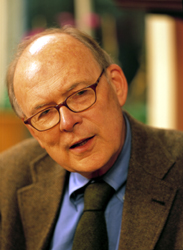James Chace
( historian, spook) | |||||||||||||||||||||
|---|---|---|---|---|---|---|---|---|---|---|---|---|---|---|---|---|---|---|---|---|---|
 | |||||||||||||||||||||
| Born | October 16, 1931 | ||||||||||||||||||||
| Died | October 8, 2004 (Age 72) | ||||||||||||||||||||
| Nationality | US | ||||||||||||||||||||
| Alma mater | Harvard | ||||||||||||||||||||
| Partner | Joan Bingham | ||||||||||||||||||||
| Spouse | Susan Chace | ||||||||||||||||||||
| Founder of | French-American Foundation | ||||||||||||||||||||
| Member of | Ditchley/US | ||||||||||||||||||||
| Interests | • • | ||||||||||||||||||||
Spooky American historian who attended the 1974 Bilderberg meeting when editor of the Foreign Affairs magazine, the house organ of the Council on Foreign Relations. Coined the propaganda phrase "the indispensable nation" with Sidney Blumenthal.
| |||||||||||||||||||||
James Clarke Chace was a spooky American historian who attended the 1974 Bilderberg meeting when editor of the Foreign Affairs magazine, the house organ of the Council on Foreign Relations.
In 1973 he published the book A world elsewhere: the new American foreign policy, where he described "how the balance of power has succeeded or failed in specific instances of American policy. He concludes with a vision of the world to come involving such forces as neo-nationalism, the growth of new transnational forces, and the way in which the balance of power holds sway." Zbigniew Brzezinski described as "Skillfully and perceptively dissects the major alternatives confronting United States foreign policy. . . . A sober blending of idealism with realism."[1]
Education
Chace graduated from Harvard University with a degree in Classics. He went to France in 1954 to conduct graduate-study research on painter Eugène Delacroix and writer Charles Baudelaire, but soon found his interest drawn to the current intellectual arena of literature and politics, which led to an intense interest in French political writers including Albert Camus and Jean-Paul Sartre.
CIA
He returned to France later the same year as a soldier and in 1955 and 1956 worked as an Army translator, which involved the translation of French newspapers for the Central Intelligence Agency. While in France he wrote a novel and was witness to the impact of that nation's withdrawal from Vietnam and its problems with a rebellion in colonialized Algeria.[2]
Career
After his return to the United States his interest in foreign policy grew as he became managing editor for East Europe, a political review of Soviet bloc affairs, from 1959 to 1969, during which time he wrote his book Conflict in the Middle East about the Six-Day War. He also was managing editor of the foreign policy journal Interplay (1967–1970) and Foreign Affairs (1970–1983).
He became editor of the World Policy Journal in 1993, where he worked for 7 years. In 1990, he was appointed Professor of Government at Bard College, in upstate New York. He later helped found and chair Bard's international affairs program, the Bard Globalization and International Affairs Program (BGIA), in New York City. His pieces were frequently printed on newspaper op-ed pages and he contributed to the New York Times Book Review in the 1980s and 1990s.
In 1996, Chace coined the phrase "the indispensable nation" with Sidney Blumenthal, to describe the concept United States as the guarantor of stability as the sole superpower within the framework of multinational institutions. The propaganda phrase was widely used when Secretary of State Madeleine Albright began including it in her speeches.
The same year, 1996, Chace and Blumenthal "introduced Hillary Clinton to aspects of New York she had not known before." Chace acted as the host of a luncheon at the Century Club attended by several dozen of the city's most influential editors and publishers, who had never met her. Afterwards, Clinton delivered a speech to the Council on Foreign Relations that they helped her craft.[2]
He was a close friend and mentor of military historian and author Caleb Carr and historian David Fromkin.
Event Participated in
| Event | Start | End | Location(s) | Description |
|---|---|---|---|---|
| Bilderberg/1974 | 19 April 1974 | 21 April 1974 | France Hotel Mont d' Arbois Megève | The 23rd Bilderberg, held in France |
References
{